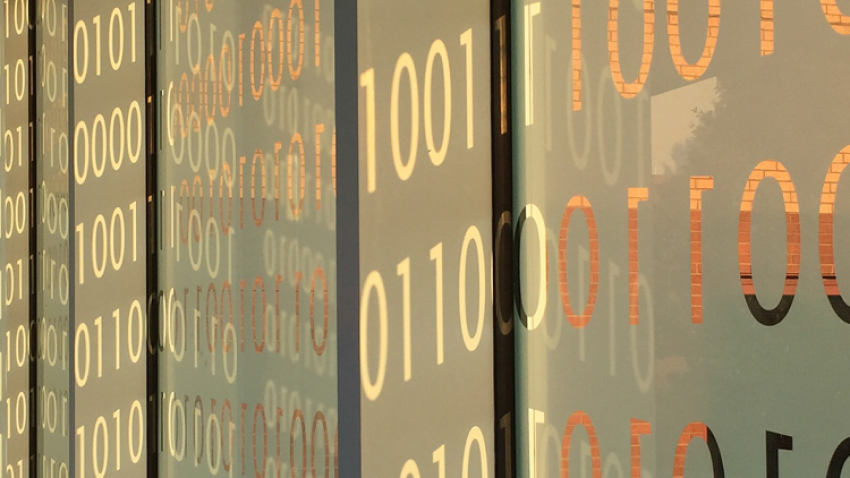
Researchers Share Latest Work Advancing the Power and Efficiency of Supercomputing
An invited presentation and a best paper award are among the highlights of Georgia Tech’s participation this week in the SIAM Conference on Parallel Processing for Scientific Computing (SIAM PP22).
Faculty and student researchers from the schools of Computational Science and Engineering, Computer Science, Electrical and Computer Engineering, and Mathematics are joining their global colleagues virtually for SIAM PP22, Feb. 23 – 26.
The conference is sponsored by the SIAM Activity Group on Supercomputing. It connects computer science (CS) and computational science and engineering (CSE) researchers with the applied mathematics community to discuss recent advances toward faster, more powerful, and more energy-efficient computational tools for high-performance computing (HPC) applications.
SIAM PP22 “is unique in its emphasis on the intersection between high performance scientific computing and scalable algorithms, architectures, and software,” according to its organizers.
Georgia Tech’s participation in the conference is being led by seven College of Computing (GT Computing) faculty members -- Regents’ Professor and School of CSE Chair Haesun Park, Stephen Fleming Chair and School of CS Chair Vivek Sarkar, CSE Professor Ümit V. Catalyurek, CS Professor Hyesoon Kim, CS Professor and GT Computing Associate Dean Alessandro Orso, CSE Professor Richard Vuduc, and CSE Assistant Professor Tobin Isaac.
Park is giving one of seven invited plenary presentations. Her presentation, Nonnegativity Constrained Low Rank Approximations for Scalable Data Analytics on Distributed Memory Parallel Environment, is set for Feb. 25 at 5:20 p.m. EST.
Orso and Sarkar are participating in a symposium, Testing Numerical Code for Heterogeneity: Lessons Learned and Emerging Projects. Along with collaborators from Sandia National Laboratories, they will discuss their recent work titled Toward Automated Test Generation for Performance Portable Programs using Clang/llvm and Formal Methods.
Also in the SIAM spotlight this week are Vuduc and Georgia Tech Alumnus Piyush Sao (CSE Ph.D. 18).
Vuduc and Sao, who was advised by Vuduc and is now a research scientist at Oak Ridge National Laboratory, are winners of the SIAG Best Paper Prize for their paper, Optimizing Communication-Avoiding Sparse Lu Factorization on Multi-GPU Clusters. Generally, the work describes a new approach to improving the efficiency and performance of sets of graphic processing units (GPUs) used in supercomputers.
Additionally, GPU-related research from Vuduc and CSE Ph.D. student Vijay Thakkar, GPU Accelerated Sparse Floyd-Warshall Algorithm for Graph All-Pair Shortest Path (APSP) Computation, was included as part of broader discussion on graph algorithms and applications.
Georgia Tech’s participation in SIAM PP22 also includes:
- Richard Vuduc and CSE Ph.D. student Chunxing Yin, Memory-Efficient Tensorized Embedding Layers for Neural Networks
- CS Research Scientist Oded Green, School of CSE Professor Ümit V. Catalyurek, and CSE Ph.D. student Abdurrahman Yasar, Parallel Graph Algorithms by Blocks for Heterogeneous Systems
- Ümit V. Catalyurek and CSE Ph.D. student Yusuf Ozkaya, Acyclic Partitioning for Mapping and Scheduling
- Ümit V. Catalyurek and CSE Ph.D. student Kasimir Gabert, Handling Runtime Variability at Scale: Elasticity for Continuously Changing Graphs
- Ümit V. Catalyurek and CSE Ph.D. student Benjamin Cobb, FIST-HOSVD: Fused In place Sequentially Truncated Higher Order Singular Value Decomposition
- Hyesoon Kim, Architecture’s Viewpoint of Hardware-Software Co-Design for Heterogeneous Computing
- Tobin Isaac, A Family of MAC-Like Discretizations for Hierarchically Refined Meshes
- CSE Ph.D. student Brandon Whitchurch, Support for Fully Parameterized Construction of Pr− Finite Elements in PETSc
- CS Senior Research Scientist Akihiro Hayashi, A Cooperative Compiler and Runtime Checkpoint/Restart Approach for Kokkos
- ECE Ph.D. students Raveesh Garg and Eric Qin, ECE Associate Professor Tushar Krishna, Understanding the Design Space of Sparse/Dense Multiphase Dataflows for Mapping Graph Neural Networks on Spatial Accelerators
- ECE Ph.D. student Geonhwa Jeong and Tushar Krishna, COMET: A Compiler Framework for Next-Generation Heterogenous Systems
- ECE Assistant Professor Callie Hao, FPGA/DNN Codesign and Acceleration
- Yuchen He (Math Ph.D. 21), Mathematics Professor Sung Ha Kang, Mathematics Professor Yingjie Liu, and Mathematics Assistant Professor Wenjing Liao, Robust Identification of Differential Equations from Noisy Data
- Tushar Krishna, A Communication-Centric Approach for Designing Flexible Accelerators
As computing revolutionizes research in science and engineering disciplines and drives industry innovation, Georgia Tech leads the way, ranking as a top-tier destination for undergraduate computer science (CS) education. Read more about the college's commitment:… https://t.co/9e5udNwuuD pic.twitter.com/MZ6KU9gpF3
— Georgia Tech Computing (@gtcomputing) September 24, 2024


